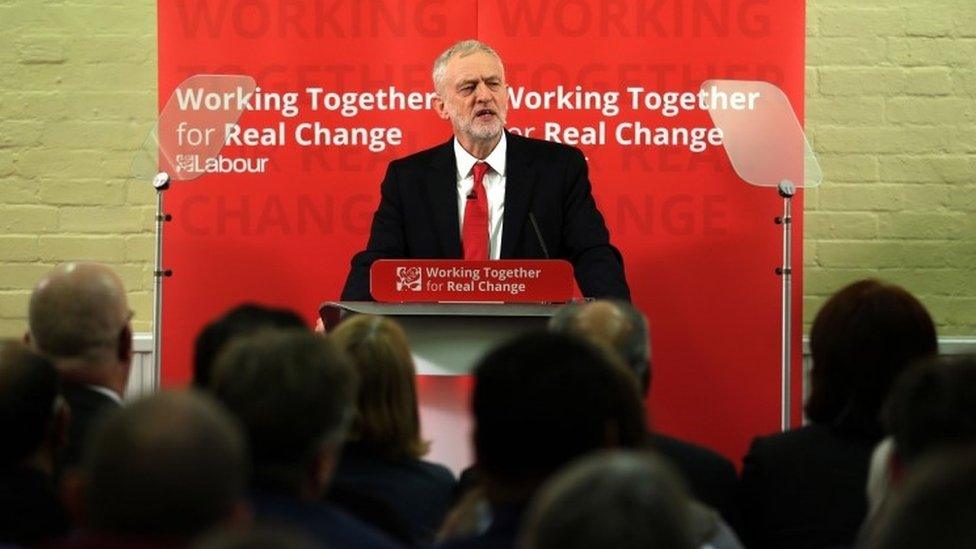Labour happier now over immigration?
- Published

"Jeremy Corbyn hasn't changed his mind about anything in 40 years," goes the mocking refrain.
It sounds scornful, and it's meant to. It's also unfair. Just a little, anyway.
Today, it became abundantly clear that Labour's leader has not changed his mind on the value, as he sees it, of free movement of people between European states. It's become equally clear - behind the scenes - that a great many colleagues wish he would.
And not just his many ideological and political opponents. Some of Mr Corbyn's close and loyal supporters think so too.
As evidence accumulates of Labour's slide in the opinion polls (and yes, I know we don't swallow polling numbers without chewing anymore, but consistent double-digit Tory leads can't be discounted), so concern has grown about a liberal approach to EU migration widely judged to be costing Labour dearly on countless doorsteps.
John Trickett, Labour's national campaign co-ordinator and a strong Corbyn ally, is said to be concerned. How could he not be?
Those hoping, praying, for a shift are said to include some within Mr Corbyn's inner circle. It's also suggested that his staunchest, arguably most powerful ally, Unite trade union leader Len McCluskey, might welcome a line closer to the instincts of many voters.
'Can be budged'
"Voters", in this context, encompasses disillusioned Labour supporters, those who backed Brexit, and perhaps members of Unite who may not share their general secretary's enthusiasm for Mr Corbyn or, for that matter, Labour under any leader at all.
The overnight briefing promised a declaration that Mr Corbyn was not "wedded" to free movement of people in the EU "on principle". Some headlines promised a significant shift, even a "U-turn".
Yet this morning, as the party leader ran through a series of broadcast media interviews, and later when he delivered the much-trailed speech setting out his thinking on Brexit, it seemed somewhere along the line, Mr Corbyn may have missed a meeting.
"He messed it up," a senior shadow cabinet member told me, only he used a much stronger word than "messed".
The pressure will continue. "Jeremy moved on NATO, eventually, and we ended up with a no-score draw on nuclear weapons," added the shadow minister. "Jeremy can be budged. Sometimes. But it takes a hell of an effort and a lot of time."
He was right, of course. Mr Corbyn now accepts, however unenthusiastically, that NATO is a defence alliance Britain must back and not merely a hangover from the cold war.
Constituency concerns
He has put aside his dream of Labour returning to a policy of unilateral nuclear disarmament. He is still adamant that he would never order a nuclear strike, a flat contradiction to the principal of nuclear deterrence which Labour has yet to confront.
He has moved, nonetheless. His position, if not his thinking, has changed.
Now he talks of free movement as a possible component of an EU divorce settlement still to be negotiated. That's a long way from the thinking of shadow Brexit secretary, Sir Keir Starmer, who expressed sympathy, when I interviewed him on my Sunday morning 5 live programme, Pienaar's Politics, for the idea of limiting access to the UK jobs market to EU migrants who have a job guaranteed.
But it opened at least the possibility of further movement in future. Only a possibility, mind. The Labour leader is stubborn. Or a man of deep conviction. Take your choice.
The enthusiasts who elected and continue to sustain Mr Corbyn continue to be zealous and loyal. Supporters of free movement of people as a useful, as well as necessary element of the EU single market may welcome Mr Corbyn's reluctance to forsake them.
But a lot of Labour MPs have moved from bitter resentment to weary fatalism, hoping that, somehow, the mood among party members changes sufficiently to produce a change. Preferably a change of leader.
These include the senior Labour MP who told me privately today that his constituency - a northern stronghold with a majority of around 15,000 - now felt like a marginal seat, vulnerable to the overtures of UKIP.
Some allies of Mr Corbyn had grown resentful that the mainstream media appeared to have lost interest in reporting the doings of Labour, or analysing the party's policy development.
No-one can make the same complaint today. I'm not sure the party's position is any happier as a result.